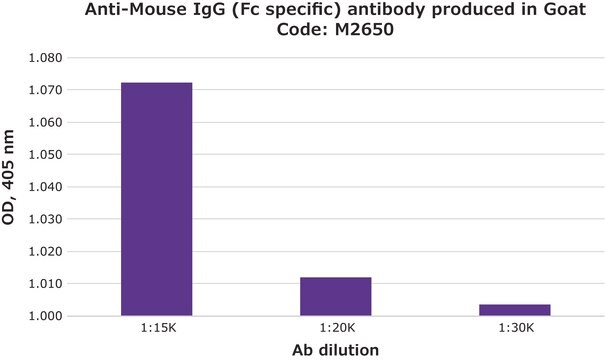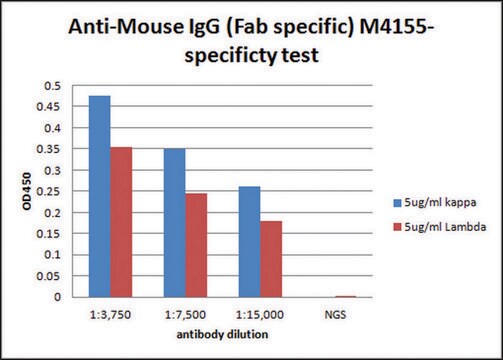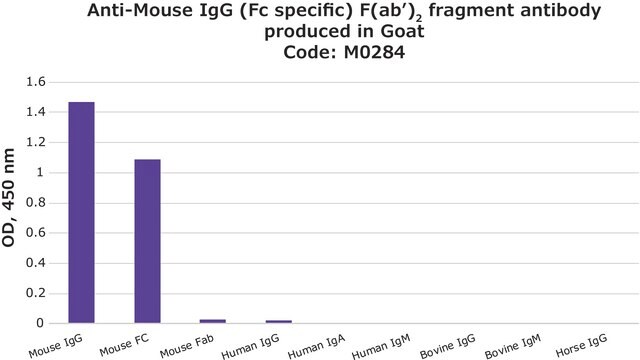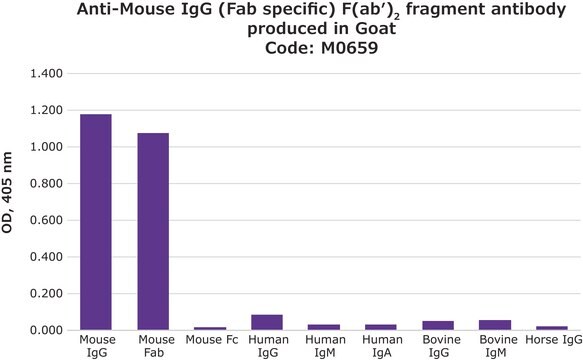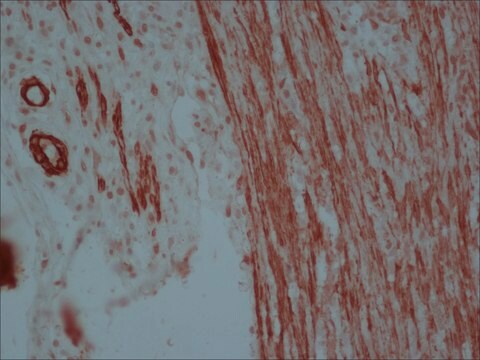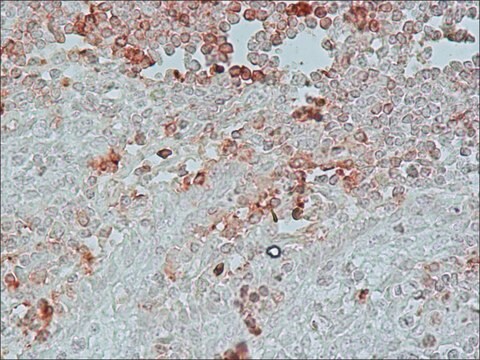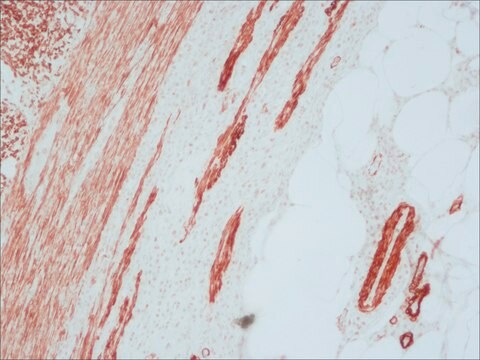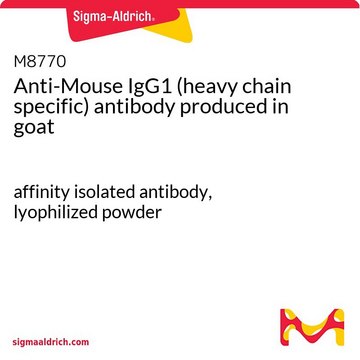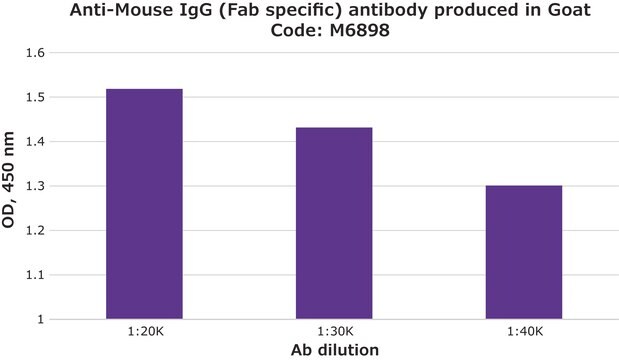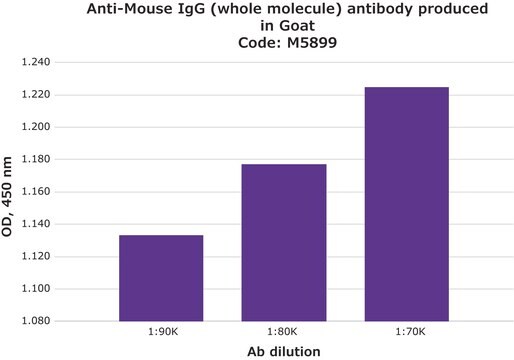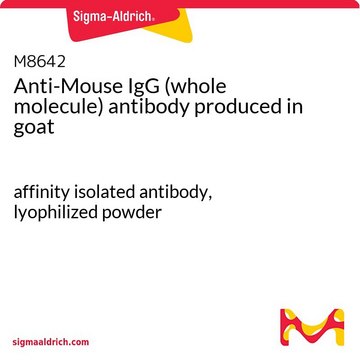M3534
Anti-Mouse IgG (Fc specific) antibody produced in goat
2.0 mg/mL, affinity isolated antibody
Iniciar sesiónpara Ver la Fijación de precios por contrato y de la organización
About This Item
Productos recomendados
origen biológico
goat
conjugado
unconjugated
forma del anticuerpo
affinity isolated antibody
tipo de anticuerpo
secondary antibodies
clon
polyclonal
concentración
2.0 mg/mL
técnicas
indirect ELISA: 1:15,000
Condiciones de envío
dry ice
temp. de almacenamiento
−20°C
modificación del objetivo postraduccional
unmodified
¿Está buscando productos similares? Visita Guía de comparación de productos
Descripción general
IgG subtype is the most abundant serum immunoglobulins of the immune system. It is secreted by B cells and is found in blood and extracellular fluids.
Inmunógeno
Mouse IgG, Fc fragment
Aplicación
Anti-Mouse IgG (Fc specific) antibody has been used in:
- enzyme linked immunosorbent assay (ELISA)
- Ouchterlony double diffusion
- anti-drug antibody immunoassay
- immunoelectrophoresis
Acciones bioquímicas o fisiológicas
Immunoglobulin G (IgG) is a glycoprotein antibody that regulates immune responses such as phagocytosis and is also involved in the development of autoimmune diseases . Mouse IgGs have four distinct isotypes, namely, IgG1, IgG2a, IgG2b, and IgG3. IgG1 regulates complement fixation in mice
Otras notas
Antibody adsorbed with human IgG and rat serum proteins
Forma física
Solution in 0.01 M phosphate buffered saline, pH 7.4, containing 15 mM sodium azide.
Nota de preparación
Adsorbed to reduce background with human or rat samples.
Cláusula de descargo de responsabilidad
Unless otherwise stated in our catalog or other company documentation accompanying the product(s), our products are intended for research use only and are not to be used for any other purpose, which includes but is not limited to, unauthorized commercial uses, in vitro diagnostic uses, ex vivo or in vivo therapeutic uses or any type of consumption or application to humans or animals.
¿No encuentra el producto adecuado?
Pruebe nuestro Herramienta de selección de productos.
Código de clase de almacenamiento
10 - Combustible liquids
Clase de riesgo para el agua (WGK)
WGK 3
Punto de inflamabilidad (°F)
Not applicable
Punto de inflamabilidad (°C)
Not applicable
Elija entre una de las versiones más recientes:
¿Ya tiene este producto?
Encuentre la documentación para los productos que ha comprado recientemente en la Biblioteca de documentos.
Los clientes también vieron
Integrating molecular detection and response to create self-signalling antibodies
Randle B, et al.
Biochemical and Biophysical Research Communications, 324(2), 504-510 (2004)
Universal immunoassay applied during early development of large molecules to understand impact of immunogenicity on biotherapeutic exposure
Bautista AC, et al.
The APPS Journal, 14(4), 843-849 (2012)
N Ban et al.
British journal of cancer, 101(2), 363-371 (2009-06-11)
The essential aetiology of radiation-induced acute myeloid leukaemia (AML) in mice is the downregulation of the transcription factor PU.1. The causative mutation of the PU.1-endocing Sfpi1 gene consists mostly of C:G to T:A transitions at a CpG site and is
Nathan H Joh et al.
Journal of pharmaceutical sciences, 109(1), 845-853 (2019-10-20)
Silicone oil is a lubricant for prefilled syringes (PFS), a common primary container for biotherapeutics. Silicone oil particles (SiOP) shed from PFS are a concern for patients due to their potential for increased immunogenicity and therefore also of regulatory concern.
Development and validation of a standardized ELISA for the detection of soluble Fc-epsilon-RI in human serum
Lexmond W, et al.
Journal of Immunological Methods, 373(1-2), 192-199 (2011)
Nuestro equipo de científicos tiene experiencia en todas las áreas de investigación: Ciencias de la vida, Ciencia de los materiales, Síntesis química, Cromatografía, Analítica y muchas otras.
Póngase en contacto con el Servicio técnico

